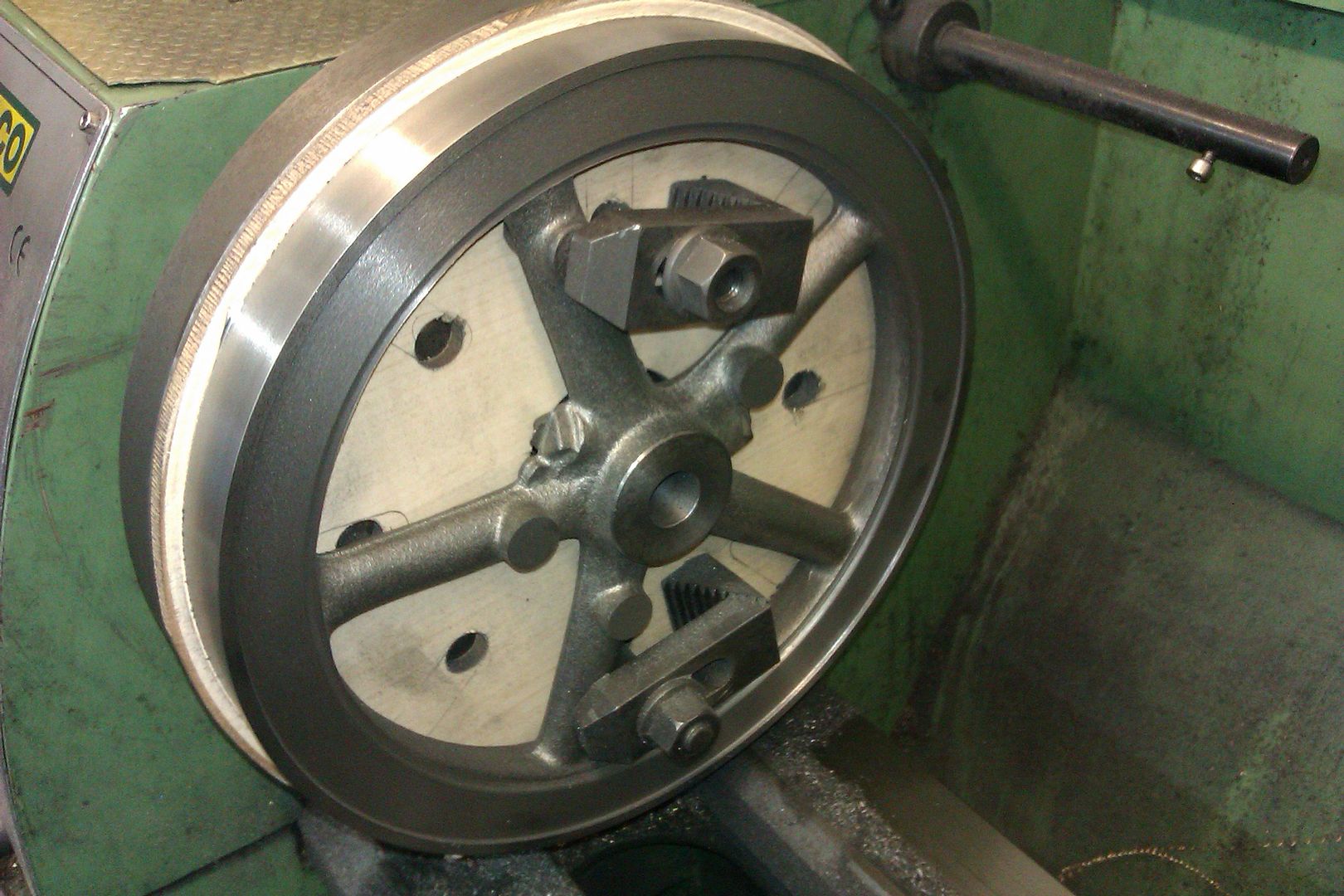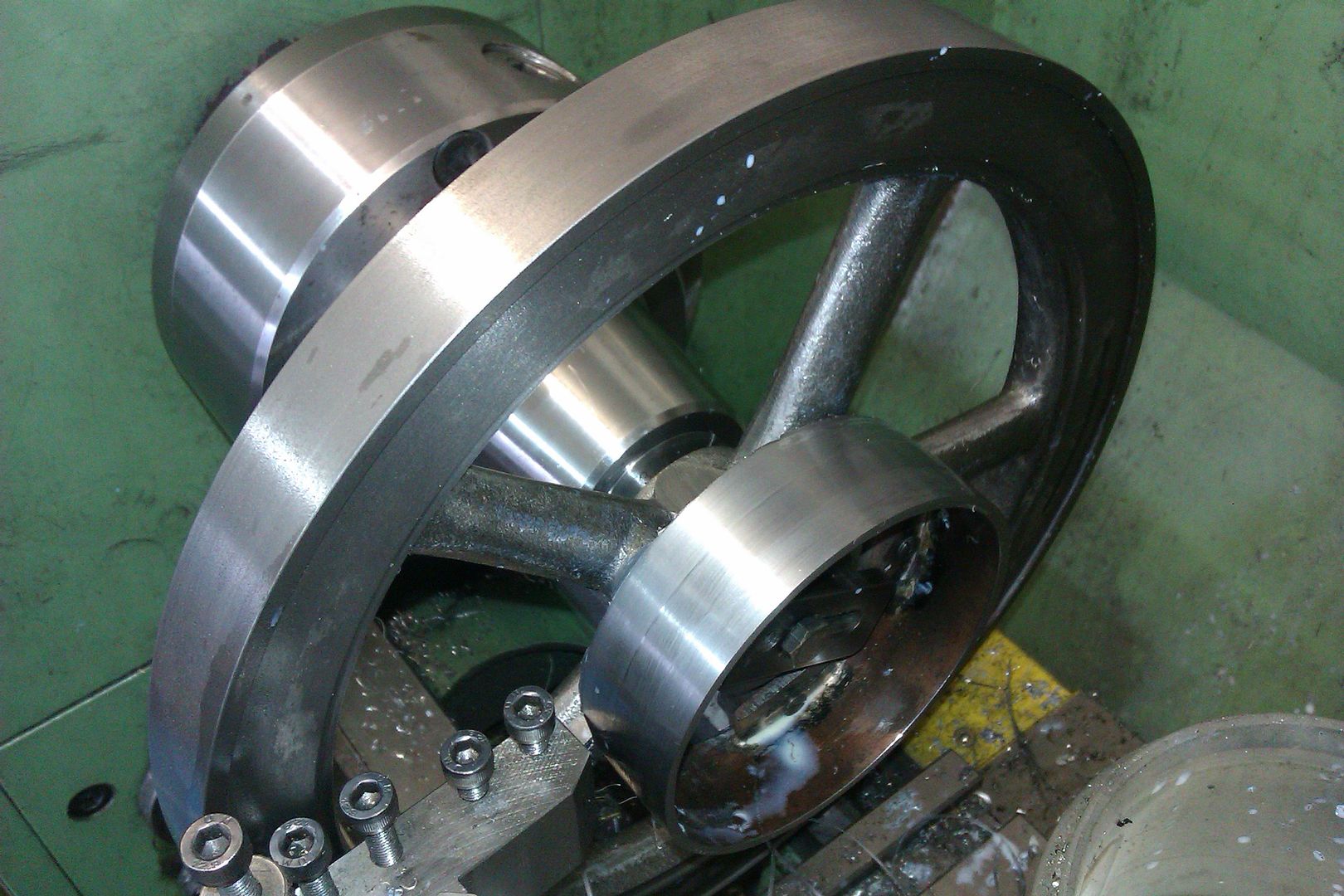How to machine a flywheel ?
Correct positioning on the face plate.
| Brian John | 19/05/2014 06:51:06 |
| 1487 forum posts 582 photos | Does anybody have any photos of (3 inch to 7 inch) flywheels corrrectly held in place on the lathe prior to machining ? From what I have read, a flywheel cannot be held in a 3 jaw chuck so it has to be bolted to a face plate. I would like to see how this is done. |
| Thor 🇳🇴 | 19/05/2014 07:17:07 |
1766 forum posts 46 photos | Hi Brian, I don't know if you have read this description (from Steves workshop), may be it can be of help. Thor Edited By Thor on 19/05/2014 07:20:13 |
| JasonB | 19/05/2014 07:31:55 |
25215 forum posts 3105 photos 1 articles | I have done several using 3-jaw and 4-jaw chucks as well as faceplate. Of the three the 3-jaw would be the least suitable as you can't easily adjust the rim true A lot depends on the size of the flywheel in relation to the chucks/faceplates/lathe available, number of spokes and how true the inner edge of the rim is to start with. Do you have a particular flywheel in mind and can you remind us of the size of your equipment. J |
| Brian John | 19/05/2014 09:54:13 |
| 1487 forum posts 582 photos | I have a Sieg C2 7 X 12 lathe. I have ordered one of each of these flywheels and pulleys : Well, I have ordered most of them ; some in brass, bronze, aluminium and cast iron. Edited By Brian John on 19/05/2014 09:54:51 |
| Jon Gibbs | 19/05/2014 11:50:40 |
| 750 forum posts | Have you seen this video from Tubalcain2 (MrPete222)? Jon |
| GaryM | 19/05/2014 12:52:40 |
314 forum posts 44 photos | Hi Brian, An alternative approach here **LINK** for a small flywheel from Harold Hall's very helpful website. I used this method for the Stuart S50 Gary |
| RICHARD GREEN 2 | 19/05/2014 14:55:37 |
| 329 forum posts 193 photos | Here are a few pictures of machining the flywheel for my 6" Burrell, the flywheel is 25 1/2" diameter on a 27" faceplate, the keyway was cut on an 8" slotter.
Richard.
|
| JasonB | 19/05/2014 15:19:02 |
25215 forum posts 3105 photos 1 articles | Where possible I prefer to hold the flywheel by the inside of the rim using the 4-jaw as there is not the problem of keeping bits of packing in place or distorting teh flywheel by clamping onto unsupported spokes. This is not always possible if your chuck is not big enough or the number of spokes gets in the way, 5 spoke flywheel ssuffer with this and really need a faceplate. This shows the sequence that I used to machine a 10.2" flywheel, although bigger than yours its the same principal just a smaller chuck and smaller flywheel. These are a couple of shots of a 9" 5 spoke that had to be done on a faceplate, the MDF packing supports the spokes so the clamps don't bend them and also allows the tool to cut past the outside of the rim without running into the faceplate
These 9" ones had a long central boss so that wa scleaned up first then used to hold the flywheel by to do the rest with a bit of tailstock support for good measure.
J |
| Roderick Jenkins | 19/05/2014 19:40:17 |
2376 forum posts 800 photos | This was how I did my Wyvern flywheels: File off all the flash and and any lumps on the faces of the rim.
Most flywheels are cast with a split pattern so registration between the 2 halves may not be perfect. Choose a side to be the "outside" i.e. the side that the engine will be mostly viewed from. Mount this side out on the faceplate with 3 sacrificial pads (ally in this case). Try to get the inside of the rim running as true as possible. Take a cut across the face of the rim and the circumference. Now reverse the flywheel and centre on the faceplate using a DTI on the rim circumference The sacrificial pads allow you to take a cut across the whole of the rim circumference The video shows a mis-registration problem. The "good" side of the rim was fine but you can see the eccentricity on the reverse side. Not too bad for the Wyvern since this has twin flywheels so both of them can be mounted with the good side on the outside - less easy to hide on a single flywheel steam engine. Hope this helps, Rod
Edited By Roderick Jenkins on 19/05/2014 19:42:15 |
| Brian John | 13/06/2014 05:02:33 |
| 1487 forum posts 582 photos | What about drilling a hole through the hub and holding the flywheel using a mandrel ? Has anybody tried this ? |
| Neil Wyatt | 13/06/2014 11:51:23 |
19226 forum posts 749 photos 86 articles | Me! Works fine for small flywheels, up to about 3 1/2", also a way of helping ensure the outer diameter is wobble-free. Not sure it's the best way for the heavy mob. About the ONLY way to finish pulleys of 1 1/2" or less in diameter. Has the advantage you can machine all three 'sides' of the rim at one setting (unless it's recessed). Neil |
| JasonB | 13/06/2014 16:52:58 |
25215 forum posts 3105 photos 1 articles | Disadvantage is that you can't really clock the cast rim to see if your drilled (preferably reamed also) hole goes in in the right place to get the unmachined inner rim running true. As Neil says the leverage on a larger flywheel can make it hard for the mandrel to keep a grip J |
| Neil Wyatt | 13/06/2014 20:12:50 |
19226 forum posts 749 photos 86 articles | Should clarify, I use a 4-jaw to turn and ream/bore the boss, then mount on a mandrel to finish the rim. Neil |
| JasonB | 13/06/2014 20:37:27 |
25215 forum posts 3105 photos 1 articles | I got the impression that Brian was asking about it as the initial way to hold the flywheel for all turning rather than the fairly common method to finish the back. You can always use an expanding mandrel to hold the flywheel while you turn the pully mounted to the flywheel so its all running true
Edited By JasonB on 13/06/2014 20:38:09 |
| Boiler Bri | 13/06/2014 20:55:05 |
856 forum posts 212 photos | By Ek lads your getting competitive with this one.
Boiler |
| Brian John | 14/06/2014 04:47:52 |
| 1487 forum posts 582 photos | Is a dial gauge essential to all this ? |
| Brian John | 17/06/2014 07:03:25 |
| 1487 forum posts 582 photos | Should the inside of the flywheel be machined or just leave that alone ? I usually clean up the inside of the flywheel and spokes with a hand file and then polish off with a wire brush in the rotary tool. |
| Michael Gilligan | 17/06/2014 08:44:38 |
23121 forum posts 1360 photos | Posted by Brian John on 14/06/2014 04:47:52:
Is a dial gauge essential to all this ? . Essential: No Convenient: Yes |
| JasonB | 17/06/2014 16:44:26 |
25215 forum posts 3105 photos 1 articles | I would say your eye should be better than a DTI in this case. Running the DTI on a cast surface you will never get it to Zero. Its usually easier to have a lathe tool or bit of bar in the toolpost that just clears the inner face so as you turn the part round by hand you can see where the flywheel is moving, aim to get as small a change in the gap as possible. DTI is best when you reverse the flywheel to do the other side Does depend a bit on the design of the flywheel, some you can just machine the outer face and two edges others need a bit of a cleanup behind the rim and to the sides of the outer web. J |
| Michael Gilligan | 17/06/2014 19:22:30 |
23121 forum posts 1360 photos | Brian, Jason's description is [predictably] excellent. I would just add that a pack of "Rizla+ Blue" cigarette papers would be a wise investment.
MichaelG. |
Please login to post a reply.
Want the latest issue of Model Engineer or Model Engineers' Workshop? Use our magazine locator links to find your nearest stockist!
Sign up to our newsletter and get a free digital issue.
You can unsubscribe at anytime. View our privacy policy at www.mortons.co.uk/privacy
- hemingway ball turner
04/07/2025 14:40:26 - *Oct 2023: FORUM MIGRATION TIMELINE*
05/10/2023 07:57:11 - Making ER11 collet chuck
05/10/2023 07:56:24 - What did you do today? 2023
05/10/2023 07:25:01 - Orrery
05/10/2023 06:00:41 - Wera hand-tools
05/10/2023 05:47:07 - New member
05/10/2023 04:40:11 - Problems with external pot on at1 vfd
05/10/2023 00:06:32 - Drain plug
04/10/2023 23:36:17 - digi phase converter for 10 machines.....
04/10/2023 23:13:48 - More Latest Posts...
- View All Topics
- Reeves** - Rebuilt Royal Scot by Martin Evans
by John Broughton
£300.00 - BRITANNIA 5" GAUGE James Perrier
by Jon Seabright 1
£2,500.00 - Drill Grinder - for restoration
by Nigel Graham 2
£0.00 - WARCO WM18 MILLING MACHINE
by Alex Chudley
£1,200.00 - MYFORD SUPER 7 LATHE
by Alex Chudley
£2,000.00 - More "For Sale" Ads...
- D1-3 backplate
by Michael Horley
Price Not Specified - fixed steady for a Colchester bantam mark1 800
by George Jervis
Price Not Specified - lbsc pansy
by JACK SIDEBOTHAM
Price Not Specified - Pratt Burnerd multifit chuck key.
by Tim Riome
Price Not Specified - BANDSAW BLADE WELDER
by HUGH
Price Not Specified - More "Wanted" Ads...
Do you want to contact the Model Engineer and Model Engineers' Workshop team?
You can contact us by phone, mail or email about the magazines including becoming a contributor, submitting reader's letters or making queries about articles. You can also get in touch about this website, advertising or other general issues.
Click THIS LINK for full contact details.
For subscription issues please see THIS LINK.
Model Engineer Magazine
- Percival Marshall
- M.E. History
- LittleLEC
- M.E. Clock
ME Workshop
- An Adcock
- & Shipley
- Horizontal
- Mill
Subscribe Now
- Great savings
- Delivered to your door
Pre-order your copy!
- Delivered to your doorstep!
- Free UK delivery!























 Register
Register Log-in
Log-in


